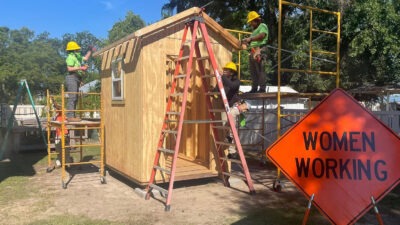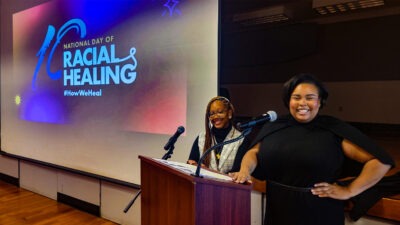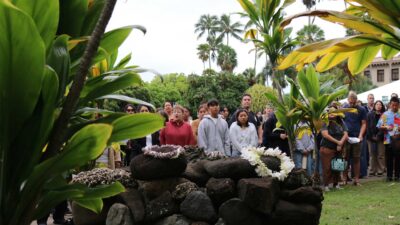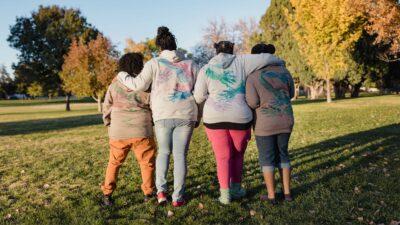This post is also available in: Español (Spanish) Kreyòl (Haitian Creole)
The National Press Foundation’s Future of the American Child fellowship, which is supported by the W.K. Kellogg Foundation, aims to train journalists in providing accurate, in-depth reporting on policies and issues that affect children and families, resulting in stronger news coverage on children’s well-being. From economic security for children and families, child health and education and juvenile justice, reporters hear from national experts and learn skills to strengthen their reporting. The story below is from Jennifer Brookland of the Detroit Free Press, who participated in the fellowship and shares her story behind the story “Centering Pregnancy transforms prenatal care, goes beyond check-ups.”
Surrounded by the women’s health team at Rainbow Babies hospital in Cleveland, clutching a tote bag full of pamphlets and scribbling in my journalist’s notebook, I had an uncomfortable realization. I might have blown it.
It was just a few years ago that I had sat in a hospital room like this one with a bunch of other pregnant women, passing around a blood pressure monitor and picking through a basket of snacks as we joked about needing to pee. It was my first session of a group model of prenatal care called Centering Pregnancy, and I wasn’t paying much attention.
At the time, Centering Pregnancy just seemed like a way for the hospital to knock out a slew of prenatal visits all at once while allowing first-time moms to ask all their questions. This was my second pregnancy – old hat – and I needed to get back to work, I told myself.
I dropped out of the group.
But now, on The Future of the American Child reporting fellowship organized by W.K. Kellogg Foundation grantee National Press Foundation, it was dawning on me that Centering Pregnancy was a really interesting and rapidly growing method of delivering holistic prenatal care to women who otherwise might be dangerously lacking in medical and social support.
The team at Rainbow Babies told us how women who participate in the program are less likely to experience preterm delivery, and that babies born to moms who were enrolled have lower infant mortality. In a city like Detroit, where Black babies are dying at more than triple the rate of white infants, that made an intervention like Centering more than a mom-to-be playgroup: it was a meaningful way to address pernicious health disparities.
I hadn’t thought about any of these things when I snagged a free granola bar, stepped on a scale and didn’t bother returning. But now, I was encouraged to take a more discerning look at what this kind of prenatal care could do for a person, or for a community.
I’d had no idea that Centering groups often address pregnant people’s basic needs, including housing and access to nutritious food. I didn’t realize the groups might get time with a perinatal mental health specialist or learn hands-on ways of reducing stress. I wasn’t aware that they sometimes bring in sleep and lactation consultants, or that at some health centers, Centering Pregnancy groups transform into Centering Parenting groups, where new parents and newborns can continue their group health care journey.
The fellowship visit to Rainbow Babies didn’t just show me that this approach was worth covering; it primed me with questions to ask health care providers in Michigan so that I could really capture what kind of value the program brought to families and the health system overall.
The story I wrote about a Centering Pregnancy group in a predominately Latinx-serving health clinic was richer for it.
As someone who writes solely about children and families, it can be easy to dismiss the sad statistics as something people already know. It’s no surprise to readers of The Detroit Free Press that women of color have worse maternal health outcomes, or that their children face more challenges to thriving.
But I also think that people want to read about solutions, and about things their own communities are trying in order to make things better.
Getting the time and access through the fellowship to hear true experts share their knowledge, experience and questions regarding children’s health and safety allowed me to think about big issues affecting our country’s kids. When I returned to my newsroom after the fellowship had ended, I had two notebooks full of information, contacts, and story ideas. Many of them were big topics like maternal and infant health that I knew I could localize.
The issues affecting children and families today are big, and frightening. The people I write about are often struggling with problems that have their underpinnings in poverty or mental health. They have fallen through the cracks of bureaucratic state systems, they suffer from a lack of resources, support, and information.
I believe that we can’t only write about the cracks in the system and the holes in the safety net. We have to write about the net – to show where things are working, or at least where people are making the effort. Because every time I write about a program like Centering Pregnancy, I’m showing that systems such as health care are failing certain families. But I’m also showing how it could be different. I’m showing that as looming as the problems seem, there are helpful people in a room, holding out a basket of granola bars, trying to help.







Comments